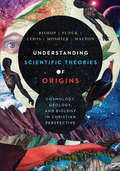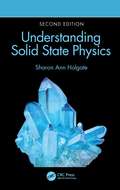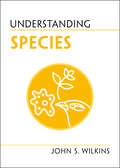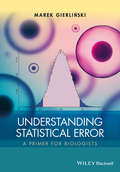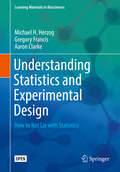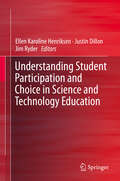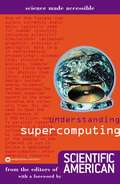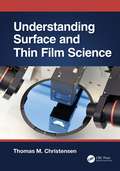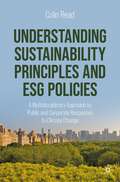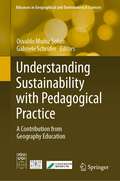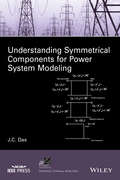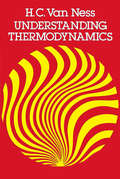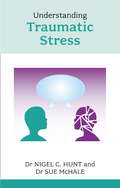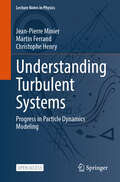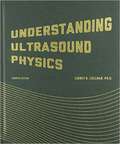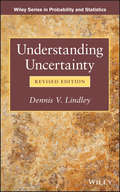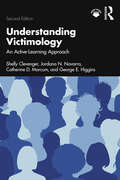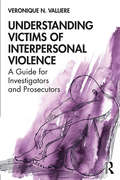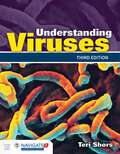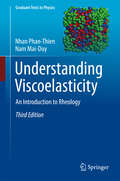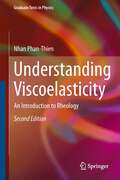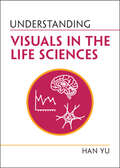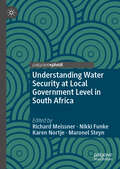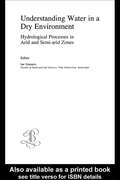- Table View
- List View
Understanding Scientific Theories of Origins: Cosmology, Geology, and Biology in Christian Perspective (BioLogos Books on Science and Christianity)
by John H. Walton Robert C. Bishop Larry L. Funck Stephen O. Moshier Raymond J. LewisThe question of origins remains a stumbling block for many. But just as the Psalmist gained insight into God's character through the observation of nature, modern scientific study can deepen and enrich our vision of the Creator and our place in his creation. In this often contentious field Bishop, Funck, Lewis, Moshier, and Walton serve as our able guides. Based on over two decades of teaching origins together in the classroom, the authors present a textbook exploring mainstream scientific theories of origins in astronomy, cosmology, chemistry, geology, biology, physical anthropology, and genetics. While many authors engage origins from a Christian perspective, this is the first work offering a full-fledged discussion of the scientific narrative of origins from the Big Bang through humankind, from biblical and theological perspectives accessible to a lay audience. Topics include Principles of biblical interpretation Close readings of relevant Genesis texts A comprehensive Trinitarian doctrine of creation Cosmic origins The geologic history of Earth The origin of life on Earth The origin of species and diversity of life Human origins New creation and creation care Science education Rather than the familiar scenario where science and faith compete, this book seeks to diffuse tensions by taking the inspiration and authority of the Bible seriously while respecting and honoring God's revelation through creation. Understanding Scientific Theories of Origins gives the reader a detailed picture of the sciences of origins along with how they fit into the story of God's creative and redemptive action.
Understanding Solid State Physics
by Sharon Ann HolgateKeeping the mathematics to a minimum yet losing none of the required rigor, Understanding Solid State Physics, Second Edition clearly explains basic physics principles to provide a firm grounding in the subject. This new edition has been fully updated throughout, with recent developments and literature in the field, including graphene and the use of quasicrystalline materials, in addition to featuring new journalistic boxes and the reciprocal lattice. The author underscores the technological applications of the physics discussed and emphasizes the multidisciplinary nature of scientific research. After introducing students to solid state physics, the text examines the various ways in which atoms bond together to form crystalline and amorphous solids. It also describes the measurement of mechanical properties and the means by which the mechanical properties of solids can be altered or supplemented for particular applications. The author discusses how electromagnetic radiation interacts with the periodic array of atoms that make up a crystal and how solids react to heat on both atomic and macroscopic scales. She then focuses on conductors, insulators, semiconductors, and superconductors, including some basic semiconductor devices. The final chapter addresses the magnetic properties of solids as well as applications of magnets and magnetism. This accessible textbook provides a useful introduction to solid state physics for undergraduates who feel daunted by a highly mathematical approach. By relating the theories and concepts to practical applications, it shows how physics is used in the real world. Key features: Fully updated throughout, with new journalistic boxes and recent applications Uses an accessible writing style and format, offering journalistic accounts of interesting research, worked examples, self-test questions, and a helpful glossary of frequently used terms Highlights various technological applications of physics, from locomotive lights to medical scanners to USB flash drives
Understanding Species (Understanding Life)
by John S. WilkinsAre species worth saving? Can they be resurrected by technology? What is the use of species in biomedicine? These questions all depend on a clear definition of the concept of 'species', yet biologists have long struggled to define this term. In this accessible book, John S. Wilkins provides an introduction to the concept of 'species' in biology, philosophy, ethics, policymaking and conservation. Using clear language and easy-to-understand examples throughout, the book provides a history of species and why we use them. It encourages readers to appreciate the philosophical depth of the concept as well as its connections to logic and science. For any interested reader, this short text highlights the complexities of a single idea in biology, the problems with the concept of 'species' and the benefits of it in helping us to answer the bigger questions and understand our living world.
Understanding Statistical Error
by Marek GierlinskiThis accessible introductory textbook provides a straightforward, practical explanation of how statistical analysis and error measurements should be applied in biological research. Understanding Statistical Error - A Primer for Biologists: Introduces the essential topic of error analysis to biologists Contains mathematics at a level that all biologists can grasp Presents the formulas required to calculate each confidence interval for use in practice Is based on a successful series of lectures from the author's established course Assuming no prior knowledge of statistics, this book covers the central topics needed for efficient data analysis, ranging from probability distributions, statistical estimators, confidence intervals, error propagation and uncertainties in linear regression, to advice on how to use error bars in graphs properly. Using simple mathematics, all these topics are carefully explained and illustrated with figures and worked examples. The emphasis throughout is on visual representation and on helping the reader to approach the analysis of experimental data with confidence. This useful guide explains how to evaluate uncertainties of key parameters, such as the mean, median, proportion and correlation coefficient. Crucially, the reader will also learn why confidence intervals are important and how they compare against other measures of uncertainty. Understanding Statistical Error - A Primer for Biologists can be used both by students and researchers to deepen their knowledge and find practical formulae to carry out error analysis calculations. It is a valuable guide for students, experimental biologists and professional researchers in biology, biostatistics, computational biology, cell and molecular biology, ecology, biological chemistry, drug discovery, biophysics, as well as wider subjects within life sciences and any field where error analysis is required.
Understanding Statistics and Experimental Design: How to Not Lie with Statistics (Learning Materials in Biosciences)
by Gregory Francis Michael H. Herzog Aaron ClarkeThis open access textbook provides the background needed to correctly use, interpret and understand statistics and statistical data in diverse settings. Part I makes key concepts in statistics readily clear. Parts I and II give an overview of the most common tests (t-test, ANOVA, correlations) and work out their statistical principles. Part III provides insight into meta-statistics (statistics of statistics) and demonstrates why experiments often do not replicate. Finally, the textbook shows how complex statistics can be avoided by using clever experimental design. Both non-scientists and students in Biology, Biomedicine and Engineering will benefit from the book by learning the statistical basis of scientific claims and by discovering ways to evaluate the quality of scientific reports in academic journals and news outlets.
Understanding Student Participation and Choice in Science and Technology Education
by Justin Dillon Ellen Karoline Henriksen Jim RyderDrawing on data generated by the EU's Interests and Recruitment in Science (IRIS) project, this volume examines the issue of young people's participation in science, technology, engineering and mathematics education. With an especial focus on female participation, the chapters offer analysis deploying varied theoretical frameworks, including sociology, social psychology and gender studies. The material also includes reviews of relevant research in science education and summaries of empirical data concerning student choices in STEM disciplines in five European countries. Featuring both quantitative and qualitative analyses, the book makes a substantial contribution to the developing theoretical agenda in STEM education. It augments available empirical data and identifies strategies in policy-making that could lead to improved participation--and gender balance--in STEM disciplines. The majority of the chapter authors are IRIS project members, with additional chapters written by specially invited contributors. The book provides researchers and policy makers alike with a comprehensive and authoritative exploration of the core issues in STEM educational participation.
Understanding Supercomputing
by Editors of Scientific AmericanA guide to understanding supercomputing and its applications.
Understanding Surface and Thin Film Science
by Thomas M. ChristensenThis book is a conceptual overview of surface and thin film science, providing a basic and straightforward understanding of the most common ideas and methods used in these fields. Fundamental scientific ideas, deposition methods and characterization methods are all examined. Relying on simple, conceptual models and figures, fundamental scientific ideas are introduced and then applied to surfaces and thin films in the first half of the book. Topics include vacuum and plasma environments, crystal structure, atomic motion, thermodynamics, electrical and magnetic properties, optical and thermal properties, and adsorbed atoms on surfaces. Common methods of gas phase thin film deposition are then introduced, starting with an overview of the film growth process and then a discussion of both physical and chemical vapor deposition methods. This is followed by an overview of a wide range of characterization techniques including imaging, structural, chemical, electrical, magnetic, optical, thermal, and mechanical techniques. Thin film science is a natural extension of surface science, especially as applications involve thinner and thinner films; distinct from other literature in the field, this book combines the two topics in a single volume. Simple, conceptual models and figures are used, supported by some mathematical expressions, to convey key ideas to students as well as practicing engineers, scientists, and technicians.
Understanding Sustainability Principles and ESG Policies: A Multidisciplinary Approach to Public and Corporate Responses to Climate Change
by Colin ReadThis textbook explores sustainability, climate change, and the corporate responsibility movement from a broad array of perspectives, including the challenges, risks, and opportunities of ESG policies, energy and environmental science, economics and philosophy, and sound public and private sector management. There is no intergenerational issue that is more pressing than the challenge of sustainability and climate change. It is a concern that will only worsen within any reader’s lifetime, especially if we fail to act. At the same time, there is growing concern among corporations arising from the Environment, Social and Governance (ESG) paradigm that includes climate risk, future profits, and stakeholder expectations. Many of our leading institutions also increasingly acknowledge a responsibility for corporate decisions since the onset of the Industrial Revolution that plays no small role in bringing us to the existential precipice of our day. This book provides necessary tools of sufficient sophistication to address complex intergenerational issues, such as global warming, economic justice and fairness, appropriate intergenerational planning, sustainable finance, corporate risk management, and governance. The book offers a vital resource for students, shareholders, sustainability practitioners, agencies, and advocates interested in climate action, intergenerational accountability, and economic sustainability.
Understanding Sustainability with Pedagogical Practice: A Contribution from Geography Education (Advances in Geographical and Environmental Sciences)
by Osvaldo Muñiz Solari Gabriele SchrüferThis book shares with an international audience of teachers, scholars, and policymakers the experience of pedagogical practices to facilitate sustainability in the world. Sustainability is seen here as a journey toward the end state of sustainable development. Therefore, the authors contribute different roads to engage teachers and students with pedagogical discourse. Overall, the book demonstrates the value of powerful knowledge through action-oriented learning based on a bottom-up process. Consequently, pedagogical practices are understood as the instructional approaches based on a social constructivist model in which active learning is performed with student-to-student engagement. Secondary teachers in social sciences and university professors in geography find the study to be a valuable source of stimulation for incorporating new ideas and resolving common problems in their learning and teaching environments. Education policymakers around the world also benefit from the only publication that presents international perspectives on geographical knowledge related to sustainability.The contributing authors are experienced scientists in the field of geography education who are giving special attention to pedagogical practices that promote new directions toward sustainable thinking.This book is the first outcome of an international collaboration officially established in 2023 between the Department of Geography and Environmental Studies at Texas State University and the Department of Geography at the University of Bayreuth.
Understanding Symmetrical Components for Power System Modeling
by J. C. DasAn essential guide to studying symmetrical component theory Provides concise treatment of symmetrical components Describes major sequence models of power system components Discusses Electromagnetic Transient Program (EMTP) models Includes worked examples to illustrate the complexity of calculations, followed by matrix methods of solution which have been adopted for calculations on digital computers
Understanding Thermodynamics (Dover Books on Physics)
by H.C. Van NessGrappling with the first and second laws of thermodynamics can test the intellectual mettle of even the most dedicated student of the physical sciences. Approaching the subject for the first time may raise more queries and doubts than are usually handled in the basic, straightforward textbook.Based on a series of lectures delivered to 500 sophomore engineering students at Rensselaer Polytechnic Institute, Dr. Van Neer's clear, lucid treatment is readily comprehensible by undergraduate-level science and engineering students. His language is informal, his examples are vivid and lively, his perspective is fresh. This book, a companion to a basic textbook, discusses thermodynamics, a topic of profound importance in the study of physics, in a manner which elucidates fundamental concepts and demonstrates their practical applicability.In these increasingly energy-conscious and costly times, as traditional energy sources are being depleted and revolutionary new sources are contemplated, appreciating the consequences of the laws of thermodynamics is more than a fascinating avenue of intellectual inquiry: it is a pragmatic concern imperative to all -- students, scientists, engineers, technicians, politicians, businessmen, and anyone facing the energy challenges of the future. Here is help understanding concepts which will prove all-important in the next century.Dr. H. C. Van Ness is a distinguished professor of chemical engineering at Rensselaer Polytechnic Institute and co-author of several textbooks on thermodynamics. He is an unsurpassed as an expert in the field.
Understanding Traumatic Stress
by Nigel HuntTraumatic events are common, and range from road traffic accidents, through rape and sexual abuse, to disaster and war. While many people deal effectively with these experiences, a minority have severe problems, which are often manifested as post-traumatic stress disorder (PTSD). The book is aimed at those with PTSD and those who are caring for someone with the disorder. It includes a strong focus on wounded military personnel. Topics include: understanding the symptoms including memory problems, avoidance and denial, emotional numbing, and hyperarousal, related disorders such as depression and substance abuse; traumatic memories and the underlying biology - how brain mechanisms are affected in the response to traumatic events. Treatments such as cognitive behavioural therapy and EMDR. Narrative approaches, whereby people develop their own stories about their traumatic experiences to help them put them into meaningful contexts; Drug techniques including anxiolytics and antidepressants, and the problems of prescribing drugs for such a complex disorder; Problems faced by carers; Vicarious or secondary trauma; Growing through experience - trauma from an alternative perspective, that of resilience and growth; Professional help - your GP, clinical psychologists and psychiatrists.
Understanding Turbulent Systems: Progress in Particle Dynamics Modeling (Lecture Notes in Physics #1039)
by Jean-Pierre Minier Christophe Henry Martin FerrandThis open access book provides a thorough introduction to modeling turbulent, dispersed, two-phase flows. It explains the physical phenomena and governing laws at play, followed by a clear and systematic overview of the statistical tools used to develop simplified or coarse-grained models. With a pedagogical approach, the book uses practical examples to explain complex physical processes and stochastic methods, making it accessible to readers familiar with basic courses in statistical physics and applied mathematics. It also highlights emerging research areas and unexplored challenges in the field. Designed as a self-contained resource, this book is ideal for graduate students and junior researchers in various branches of physics. At the same time, it serves as a valuable reference for experts seeking deeper insights into turbulent, dispersed, two-phase flows.
Understanding Ultrasound Physics
by Sidney K. EdelmanWe continue to innovate in the arena of physics exam preparation. In this 4th edition, we have added chapters describing optimization of Doppler imaging and sonographers in the clinical setting. We have added many topics such as patient communication, medical ethics, informed consent, ergonomics, elastography, and standard precautions that should be taken as part of the educational and exam preparation processes. We have expanded the information provided on quality assurance, bioeffects, displays, and imaging processing, and restructured much of how we present basic physics information, including axial and lateral resolution.
Understanding Uncertainty (Wiley Series in Probability and Statistics)
by Dennis V. LindleyPraise for the First Edition"...a reference for everyone who is interested in knowing and handling uncertainty."--Journal of Applied StatisticsThe critically acclaimed First Edition of Understanding Uncertainty provided a study of uncertainty addressed to scholars in all fields, showing that uncertainty could be measured by probability, and that probability obeyed three basic rules that enabled uncertainty to be handled sensibly in everyday life. These ideas were extended to embrace the scientific method and to show how decisions, containing an uncertain element, could be rationally made.Featuring new material, the Revised Edition remains the go-to guide for uncertainty and decision making, providing further applications at an accessible level including:A critical study of transitivity, a basic concept in probabilityA discussion of how the failure of the financial sector to use the proper approach to uncertainty may have contributed to the recent recessionA consideration of betting, showing that a bookmaker's odds are not expressions of probabilityApplications of the book's thesis to statisticsA demonstration that some techniques currently popular in statistics, like significance tests, may be unsound, even seriously misleading, because they violate the rules of probabilityUnderstanding Uncertainty, Revised Edition is ideal for students studying probability or statistics and for anyone interested in one of the most fascinating and vibrant fields of study in contemporary science and mathematics.
Understanding Victimology: An Active-Learning Approach
by George E. Higgins Catherine D. Marcum Shelly Clevenger Jordana N. NavarroUnderstanding Victimology: An Active Learning Approach is the only textbook with extensive discussion of both online and offline victimization reinforced by group and individual learning activities. Our textbook offers instructors a variety of active learning exercises – in the book itself and in the authors’ ancillaries – that engage students in the material and shed light on the experiences of marginalized social groups. Through these activities, students become engaged with the material at a higher level of learning. They learn how victimization happens and the challenges people who experience crime face in acquiring assistance from the criminal-legal system at a more intimate level instead of simply reading about it. Students also build their abilities to work with others in a collaborative learning environment, encouraging professional socialization for the future. The chapters in this second edition address gaps in information typically presented in victimology that ignore prevention or intervention, even though these topics are currently at the forefront of the national conversation going on about sexual violence in higher education. New to this edition are added coverage of immigrants and minorities and new chapters on the media and victimization and on victimization across the gender spectrum, as well as an online instructor resource covering UK case studies, legal framework, and social context that broadens the book’s global appeal. Suitable for undergraduate courses in victimology, this book also serves the needs of sociology and women’s studies courses and can be taught university-wide as part of diversity and inclusion initiatives.
Understanding Victims of Interpersonal Violence: A Guide for Investigators and Prosecutors
by Veronique N. ValliereUnderstanding Victims of Interpersonal Violence: A Guide for Investigators and Prosecutors provides accessible information for criminal justice personnel "in the trenches" with victims of violence to aid in understanding and explaining their behavior. This guide sheds light on interpersonal violence victims’ decisions and actions by providing context and naming factors that commonly impact victim responses. These include internal factors such as culture, religion, shame, and personality, as well as external factors like access to services, support systems, and resources. These factors inhibit or facilitate responses like disclosure, resistance, and participation (or lack thereof) in the prosecution of the offenders. This book also explores the influence of the perpetrator, as well as more deeply examining victim responses that typically offer challenges to investigators and prosecutors; for example, continued contact with the offender, lack of resistance, and issues in disclosure. Finally, the guide provides concrete tools to assist investigators in interviewing and for prosecutors to use during the prosecutorial process. This book is designed for investigators, prosecutors, advocates, criminal justice practitioners, and students of these subjects.
Understanding Viruses
by Teri ShorsThe Third Edition of best-selling Understanding Viruses provides a strong, comprehensive introduction to human viral diseases. It provides a balanced approach to virology, combining the molecular, clinical, and historical aspects, making it the ideal text for undergraduate students majoring in biology, microbiology, medical technology, or pre-med.
Understanding Viscoelasticity
by Nhan Phan-Thien Nam Mai-DuyA fully realized portrait of one woman's life in all its complexity, by the National Book Award-winning author An ordinary life--its sharp pains and unexpected joys, its bursts of clarity and moments of confusion--lived by an ordinary woman: this is the subject of "Someone," Alice McDermott's extraordinary return, seven years after the publication of "After This. " Scattered recollections--of childhood, adolescence, motherhood, old age--come together in this transformative narrative, stitched into a vibrant whole by McDermott's deft, lyrical voice. Our first glimpse of Marie is as a child: a girl in glasses waiting on a Brooklyn stoop for her beloved father to come home from work. A seemingly innocuous encounter with a young woman named Pegeen sets the bittersweet tone of this remarkable novel. Pegeen describes herself as an "amadan," a fool; indeed, soon after her chat with Marie, Pegeen tumbles down her own basement stairs. The magic of McDermott's novel lies in how it reveals us all as fools for this or that, in one way or another. Marie's first heartbreak and her eventual marriage; her brother's brief stint as a Catholic priest, subsequent loss of faith, and eventual breakdown; the Second World War; her parents' deaths; the births and lives of Marie's children; the changing world of her Irish-American enclave in Brooklyn--McDermott sketches all of it with sympathy and insight. This is a novel that speaks of life as it is daily lived; a crowning achievement by one of the finest American writers at work today. A "Publishers Weekly" Best Fiction Book of the YearA "Kirkus Reviews "Best Fiction Book of 2013 A "New York Times "Notable Book of 2013 A "Washington Post "Notable Fiction Book of 2013 An NPR Best Book of 2013
Understanding Viscoelasticity: An Introduction to Rheology
by Nhan Phan-ThienThis book presents an introduction to viscoelasticity; in particular, to the theories of dilute polymer solutions and dilute suspensions of rigid particles in viscous and incompressible fluids. These theories are important, not just because they apply to practical problems of industrial interest, but because they form a solid theoretical base upon which mathematical techniques can be built, from which more complex theories can be constructed, to better mimic material behaviour. The emphasis is not on the voluminous current topical research, but on the necessary tools to understand viscoelasticity at a first year graduate level. The main aim is to provide a still compact book, sufficient at the level of first year graduate course for those who wish to understand viscoelasticity and to embark in modeling of viscoelastic multiphase fluids. To this end, a new chapter on Dissipative Particle Dynamics (DPD) was introduced which is relevant to model complex-structured fluids. All the basic ideas in DPD are reviewed, with some sample problems to illustrate the methodology.
Understanding Visuals in the Life Sciences (Understanding Life)
by Han YuFrom photographs to micrographs, from the various types of graphs to fun, interactive visuals and games, there are many different forms in which science can be visualised. However, all of these forms of visualisation in the Life Sciences are susceptible to misunderstandings and misinformation. This accessible and concise book demonstrates the misconceptions surrounding the visuals used in popular life science communication. Richly illustrated in colour, this guide is packed with examples of commonly used visual types: photographs, micrographs, illustrations, graphs, interactive visuals, and infographics allowing visual creators to produce more effective visuals that aspire to being both attractive and informative for their target audience. It also encourages non-specialist readers to be more empowered and critical, to ask difficult questions, and to cultivate true engagement with science. This book is an invaluable resource for life scientists and science communicators, and anyone who creates visuals for public or non-specialist readers.
Understanding Water Security at Local Government Level in South Africa
by Richard Meissner Nikki Funke Karen Nortje Maronel SteynThis book provides unique insights into the complex issue of water security in South Africa. Based on qualitative research conducted through face-to-face structured interviews and focus group discussions with individuals, traditional leaders, municipal officials, researchers, businesspeople and farmers in the two local governments – the Sekhukhune District and eThekwini Metropolitan Municipalities – it focuses on the peoples’ understanding of the concept of water security and whether they believe that the municipalities have achieved water security for all. The research is supported by water security-related statistics, particularly those pertaining to water quality and quantity, and an extensive literature review for the concept of water security. In addition to assessing the state of water security in both municipalities, the book presents a new water security definition and typology, and offers valuable recommendations for future research.
Understanding Water in a Dry Environment: IAH International Contributions to Hydrogeology 23 (IAH - International Contributions to Hydrogeology)
by Ian SimmersIn order to provide water security in the twenty-first century, there is universal agreement that a continuation of current policies and extrapolation of trends is not an option. Also clear is that from both water supply and development perspectives, the world's arid and semi-arid regions are those currently and potentially experiencing the highest
Understanding Waves (Inspire Science, Grade 8 Integrated #Unit 3)
by Douglas Fisher Ralph M. Feather Alton L. BiggsNIMAC-sourced textbook
